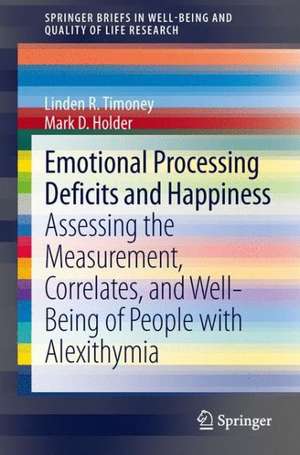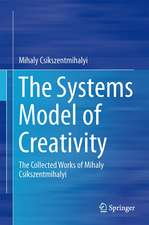Emotional Processing Deficits and Happiness: Assessing the Measurement, Correlates, and Well-Being of People with Alexithymia: SpringerBriefs in Well-Being and Quality of Life Research
Autor Linden R. Timoney, Mark D. Holderen Limba Engleză Paperback – 5 aug 2013
Din seria SpringerBriefs in Well-Being and Quality of Life Research
- 5%
 Preț: 252.59 lei
Preț: 252.59 lei -
 Preț: 277.91 lei
Preț: 277.91 lei - 5%
 Preț: 324.88 lei
Preț: 324.88 lei - 5%
 Preț: 422.13 lei
Preț: 422.13 lei -
 Preț: 410.01 lei
Preț: 410.01 lei - 5%
 Preț: 326.32 lei
Preț: 326.32 lei -
 Preț: 379.09 lei
Preț: 379.09 lei - 5%
 Preț: 358.48 lei
Preț: 358.48 lei - 5%
 Preț: 322.85 lei
Preț: 322.85 lei - 5%
 Preț: 357.23 lei
Preț: 357.23 lei -
 Preț: 410.94 lei
Preț: 410.94 lei - 5%
 Preț: 356.32 lei
Preț: 356.32 lei - 5%
 Preț: 356.67 lei
Preț: 356.67 lei - 5%
 Preț: 357.61 lei
Preț: 357.61 lei -
 Preț: 377.73 lei
Preț: 377.73 lei -
 Preț: 375.07 lei
Preț: 375.07 lei - 5%
 Preț: 329.66 lei
Preț: 329.66 lei - 5%
 Preț: 356.46 lei
Preț: 356.46 lei -
 Preț: 378.34 lei
Preț: 378.34 lei - 5%
 Preț: 358.48 lei
Preț: 358.48 lei - 5%
 Preț: 358.32 lei
Preț: 358.32 lei -
 Preț: 376.80 lei
Preț: 376.80 lei - 5%
 Preț: 421.92 lei
Preț: 421.92 lei -
 Preț: 379.30 lei
Preț: 379.30 lei -
 Preț: 378.71 lei
Preț: 378.71 lei -
 Preț: 375.45 lei
Preț: 375.45 lei - 5%
 Preț: 358.84 lei
Preț: 358.84 lei -
 Preț: 385.44 lei
Preț: 385.44 lei -
 Preț: 376.04 lei
Preț: 376.04 lei - 5%
 Preț: 364.85 lei
Preț: 364.85 lei -
 Preț: 355.07 lei
Preț: 355.07 lei -
 Preț: 357.86 lei
Preț: 357.86 lei -
 Preț: 411.54 lei
Preț: 411.54 lei - 5%
 Preț: 329.95 lei
Preț: 329.95 lei -
 Preț: 377.95 lei
Preț: 377.95 lei -
 Preț: 478.53 lei
Preț: 478.53 lei - 5%
 Preț: 357.77 lei
Preț: 357.77 lei - 5%
 Preț: 356.67 lei
Preț: 356.67 lei -
 Preț: 410.55 lei
Preț: 410.55 lei - 5%
 Preț: 362.16 lei
Preț: 362.16 lei - 5%
 Preț: 357.23 lei
Preț: 357.23 lei - 5%
 Preț: 357.97 lei
Preț: 357.97 lei - 5%
 Preț: 359.42 lei
Preț: 359.42 lei - 5%
 Preț: 358.84 lei
Preț: 358.84 lei -
 Preț: 442.02 lei
Preț: 442.02 lei -
 Preț: 378.54 lei
Preț: 378.54 lei
Preț: 376.80 lei
Nou
Puncte Express: 565
Preț estimativ în valută:
72.10€ • 75.28$ • 59.54£
72.10€ • 75.28$ • 59.54£
Carte tipărită la comandă
Livrare economică 15-29 aprilie
Preluare comenzi: 021 569.72.76
Specificații
ISBN-13: 9789400771765
ISBN-10: 9400771762
Pagini: 100
Ilustrații: VII, 90 p.
Dimensiuni: 155 x 235 x 5 mm
Greutate: 0.15 kg
Ediția:2013
Editura: SPRINGER NETHERLANDS
Colecția Springer
Seria SpringerBriefs in Well-Being and Quality of Life Research
Locul publicării:Dordrecht, Netherlands
ISBN-10: 9400771762
Pagini: 100
Ilustrații: VII, 90 p.
Dimensiuni: 155 x 235 x 5 mm
Greutate: 0.15 kg
Ediția:2013
Editura: SPRINGER NETHERLANDS
Colecția Springer
Seria SpringerBriefs in Well-Being and Quality of Life Research
Locul publicării:Dordrecht, Netherlands
Public țintă
ResearchCuprins
Chapter 1. Definition of Alexithymia.- Chapter 2. The History of the Construct and the Etiology of Alexithymia.- Chapter 3. The Importance of Research on Alexithymia.- Chapter 4. Measurement of Alexithymia.- Chapter 5. Recommendations for Measurement.- Chapter 6. Correlates of Alexithmia.- Chapter 7. Alexithymia and Personality.- Chapter 8. Alexithymia and Subjective Well-Being.- Chapter 9. Summary and Recommendations for Future Research.
Recenzii
From the reviews:
“Timoney and Holder have succeeded in including a substantial amount of research on alexithymia and squeezing it into their book … . The strength of the book is that it cites a large number of studies on different topics in the alexithymia literature. Indeed, each chapter, and section within each chapter, is largely a litany of research studies. … is best suited to the scholar or student who is interested in alexithymia and seeking a quick and accessible review of any given topic … .” (Mark A. Lumley and Matthew J. Jasinski, PsycCRITIQUES, Vol. 59 (4), January, 2014)
“Timoney and Holder have succeeded in including a substantial amount of research on alexithymia and squeezing it into their book … . The strength of the book is that it cites a large number of studies on different topics in the alexithymia literature. Indeed, each chapter, and section within each chapter, is largely a litany of research studies. … is best suited to the scholar or student who is interested in alexithymia and seeking a quick and accessible review of any given topic … .” (Mark A. Lumley and Matthew J. Jasinski, PsycCRITIQUES, Vol. 59 (4), January, 2014)
Textul de pe ultima copertă
This briefs reviews the literature on alexithymia with a particular focus on the relation between positive well-being and alexithymia. It starts by exploring the definition, history and etiology of the construct. The briefs then discusses the importance of research and presents new research which sheds light on why alexithymia is characterized by poor well-being. The research strongly suggests that people who score high in alexithymia are low in aspects of positive well-being such as happiness, life satisfaction, and positive affect, and high in aspects of negative well-being, such as depression and negative affect. Next, the book examines the correlates of alexithymia and the latter’s relation with personality and subjective well-being. Although there has been an increased interest in human flourishing, and even though research in positive psychology has included personality, there has been little application of positive psychology to people with deficits in emotional processing including people with alexithymia. This briefs fills that gap.
Caracteristici
Provides the most comprehensive review of the relationship between well-being and alexithymia Critically reviews the assessment of alexithymia Expands the domain of positive psychology to include those with emotional processing disorders Identifies directions for future research on alexithymia Suggests a different approach to the treatment of alexithymia











